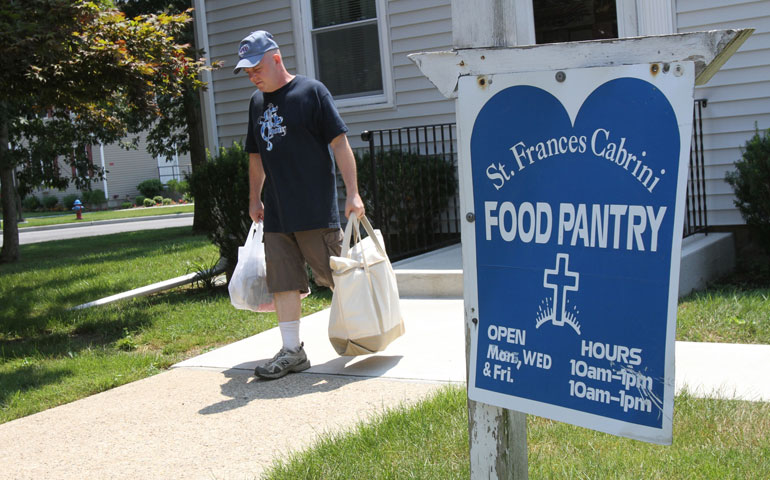
A man carries shopping bags of food he received during a visit to the parish social ministry office at St. Frances Cabrini Church in Coram, N.Y., in 2012. (CNS/Gregory A. Shemitz)
The needs of poor and vulnerable Americans must remain at the top of the country's spending priorities as Congress debates the federal budget in the coming weeks, the chairmen of two U.S. Conference of Catholic Bishops committees said.
Holding firm to earlier stances, Bishop Stephen Blaire of Stockton, Calif., chairman of the Committee on Domestic Justice and Human Development, and Bishop Richard Pates of Des Moines, Iowa, chairman of the Committee on International Justice and Peace, told members of Congress in a March 18 letter that budget expenditures reflect the priorities of a nation.
"As Catholic pastors, we continue to emphasize that these choices are economic, political and moral," the bishops said.
"While we lack the competence to offer a detailed critique of entire budget proposals, we do ask you to consider the human and moral dimensions of these choices," they said.
The letter comes as Congress prepared to debate the fiscal year 2014 budget. Contrasting proposals have risen to the forefront in the House of Representatives and the Senate.
The House budget, written by Rep. Paul Ryan, R-Wis., calls for reducing domestic spending and lowering tax rates for most income earners while growing military spending. His proposal, made as chairman of the House Budget Committee, calls for privatizing Medicare, reducing funding for Medicaid and food stamps by turning them into block grants administered by states, and abolishing the Affordable Care Act.
Ryan has said such steps are necessary to balance the budget by 2023 and begin reducing the federal deficit.
The Senate budget, offered by Sen. Patty Murray, D-Wash., calls for slower growth in discretionary spending and new revenues from wealthy Americans and the biggest corporations. In introducing her proposal, Murray said the budget "tackles the deficit and debt the way the American people wanted it done."
The real debate will occur once both houses of Congress adopt a budget plan and leaders from both chambers sit down in an attempt to iron out differences in a comprehensive bill.
The budget debate comes on the heels of automatic across-the-board spending cuts that took effect March 1. Known as sequestration, the cuts in current fiscal-year spending total about $109 billion. They equally affect domestic and military programs in an attempt to whittle down the country's $16 trillion deficit.
While supporting the goal of reducing "future unsustainable deficits," Blaire and Pates told Congress "this worthy goal" must be "pursued in ways that protect poor and vulnerable people at home and abroad."
The bishops reiterated their call for a circle of protection around people struggling to find work, obtain adequate housing, put food on their tables and place their children in educational programs. In particular, they cited programs such as Head Start; Supplemental Nutrition Assistance Program, formerly known as food stamps; Pell grants; Supplemental Security Income; Temporary Assistance to Needy Families; and poverty-focused international assistance as vital to protect.
The letter called for leaving in place the earned income tax credit and the low-income component of the child tax credit.
Blaire and Pates also cautioned against repealing the Affordable Care Act altogether, saying the bishops' opposition to it is limited to "addressing the morally problematic features of health care reform."
The bishops' conference has opposed some of the regulations governing implementation of the Affordable Care Act, such as the contraceptive mandate and its current limited definition of those religious organizations that would be exempt.
While calling for Congress to consider options to raise revenues, the bishops shied away from offering specific ideas to do so.
"Our nation has an obligation to address the impact of future deficits on the health of the economy, to ensure stability and security for future generations, and to use limited resources efficiently and effectively," they wrote. "A just framework for future budgets cannot rely on disproportionate cuts in essential services to poor persons; it requires shared sacrifice by all, including raising adequate revenues, eliminating unnecessary military spending and addressing the long-term costs of health insurance and retirement programs fairly."


